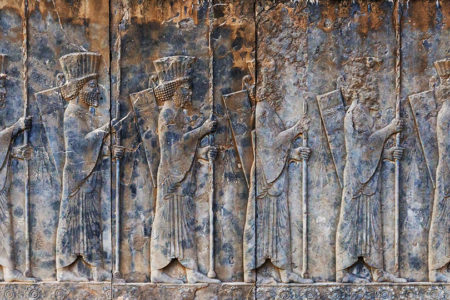Nehemiah The Leader
Nehemiah was a contemporary of Ezra and cupbearer to the king of Persia. He heard of the sorry situation in Jerusalem and the pitiful plight of its inhabitants, was moved with compassion for his countrymen and God’s city, and interceded for them with tears. Sensing a specific call from God, Nehemiah embarked on a bold strategy: He requested leave of the king to return to Jerusalem to rebuild the walls of the city. The king granted him permission.
Once in Jerusalem, Nehemiah quietly surveyed the circumstances by night and formulated a plan. Later he challenged his compatriots to reconstruct the shattered city walls.
With precision and strategy, this godly leader coordinated the entire process. Despite external opposition from his nefarious detractors and carping criticism from within the ranks of his own people, he completed the task in merely fifty-two days. Were the inveterate enemies of Nehemiah to have asked, they would have been told that only God’s empowering and enablement could explain such a significant feat (Neh. 1—7).
In stark contrast, however, the task of reviving God’s people spiritually, reforming their sinful ways, and renewing their covenant relationship with the Lord would demand prolonged years of Nehemiah’s ministry and leadership.
In Nehemiah we find spiritual characteristics of a godly leader— qualities God’s people can emulate through the power of His indwelling Spirit.1 Nehemiah was:
- Convinced of God’s Call. Nehemiah 1:1—2:10 tells of Nehemiah’s sense of divine call to his specific ministry. In prayer, amid tears and a heart burdened for his beloved city and people, God’s chosen servant was commissioned. God’s call always carries with it the guarantee of His enablement.
- Dependent on God in Prayer. Nehemiah knew the Source of power for his ministry. It was God alone. That Source was indispensable, accessible by prayer, and utterly dependable. The book opens and closes with prayer: some prayers short, some longer, others praise and doxology (1:4; 2:4; 4:4, 9; 5:19; 6:9, 14; 9:5–37; 13:14, 22, 29).
- Focused in Vision. Nehemiah possessed God-given vision. He was always able to see the big picture clearly and discern situations and people from the divine perspective. His classic response to his enemies in Nehemiah 6:3 says it all: “I am doing a great work, so that I cannot come down.”
- Upright in Integrity. Not once did Nehemiah compromise his integrity. He realized his ultimate accountability was to God. The mixed marriages (10:28–31; 13:23–31) and unholy alliance in the Temple (13:1–8) are obvious examples. Character is seen in conduct.
- Submissive to Authority. This exemplary leader readily submitted to God-ordained authorities: the king (1:1—2:8), the Word of God (8:1–18), and His will and ways (9:1—13:31). He was not a “loose cannon.”
- Driven in Purpose. Nehemiah planned carefully (2:11–15), prioritized systematically (2:16–18; 3:1–32), and pursued his objectives prayerfully (4:9; 8:1–8). He was unflappable, composed, and secure. Every aspect of his ministry was intentional. And when the walls were built, he joined the people in thankful and thoughtful celebration (7:1–6; 8:12).
- Compelled to Discern Wisely. God’s servant was a wise discerner of people, circumstances, and enemy tactics (2:17–20; 4:1–3, 7–23). In New Testament terms, he was “not ignorant” of Satan’s devices (2 Cor. 2:11; cf. Eph. 6:11). His “spiritual radar” was always on.
- Available to Serve. Whether traveling (Neh. 2:5–11), confronting opponents (2:19–20; 4:1–23), or combating spiritual compromise (13:23–31) and slanderous criticism (4:3–6), Nehemiah always stepped up courageously to fulfill his obligations.
- Exemplary in Conduct. In every aspect of his life and ministry, Nehemiah was commendable. He is blameless though not sinless (cf. 9:13). What a testimony to God’s grace in his life.
- Confident in God. Nehemiah’s confidence was in God alone. Out of this confidence, he worked hard and sacrificially, even extending hospitality to more than 150 compatriots on one occasion (5:17). He proved that God is no man’s debtor.
- Able to Delegate. Nehemiah co-opted people and delegated responsibilities to them. With sword and trowel they stood side by side to get the wall built (4:6–23). Spiritual leaders are team builders, for not even the most competent or experienced can get the job done alone.
- Filled With Determination. With Jerusalem a city of destiny (yet now in reproach) and the Jewish people strategically placed in God’s plan of salvation for the world through Messiah (Gen. 12:1–3; Dt. 7:6–8; Jn. 4:22), Nehemiah recognized the great work he was doing as God’s chosen servant (cf. 6:3). With dogged determination, he fulfilled his ministry. And in so doing he enabled others to do likewise.
- Committed to Glorify God in Everything. This faithful servant sought to glorify God in all he did. With humility and self-abnegation he came (like Jesus, Phil. 2:5–11) as a servant to his people. He identified with them. He shared in their trials, burdens, and dangers. He was never self-opinionated or self-promoting. Like Isaiah, Nehemiah knew that God never gives His glory to another (Isa. 42:8; 48:11).
And Like Ezra, Nehemiah, too, prefigured Israel’s Messiah:
Like Ezra, Nehemiah portrays Christ in His ministry of restoration. [He] illustrates Christ in that he gives up a high position in order to identify with the plight of his people; he comes with a specific mission and fulfills it; and his life is characterized by prayerful dependence on God.
In this book, everything is restored except the king. The temple is rebuilt, Jerusalem is reconstructed, the covenant is renewed, and the people are reformed. The messianic line is intact, but the King is yet to come. The decree of Artaxerxes in his twentieth year (Neh. 2:1) marks the beginning point of Daniel’s prophecy of the Seventy Weeks (Dan. 9:25–27). . . . The Messiah will come at the end of the sixty-nine weeks, and this is exactly fulfilled in A.D. 33.2
Nehemiah was a godly servant-leader whose life, ministry, and testimony pointed to his Lord. Let us “follow the leader” in our walk and service for Him.
ENDNOTES
- For this analysis, I am deeply indebted to Warren W. Wiersbe. See his book Be Determined (Colorado Springs, CO: Victor Books, 1992), 151–160.
- Bruce Wilkinson and Kenneth Boa, Talk Thru the Bible (Nashville: Thomas Nelson, 1983), 1:126. Refer also to Charles R. Swindoll, God’s Masterwork, Vol. 11, Ezra through Daniel (Anaheim, CA: Insight for Living, 1997), 13.







Very good article, I really appreciate your love to search and re-search Bible recorded words.
Thank you,
David Chiang/Singapore
Dear brother,
I was studying the book of Nehemiah. As part of my research I found your thoughtful summary of the leadership ability of Nehemiah. I am impressed and inspired. Took some notes and added them to my research notes. God bless you brother. Continue sharing the spriritual thoughts as a God inspires you. Like me, thousands or millions may inspired and find peace in their hearts.
I live in New York. Hope to visit Australia one day